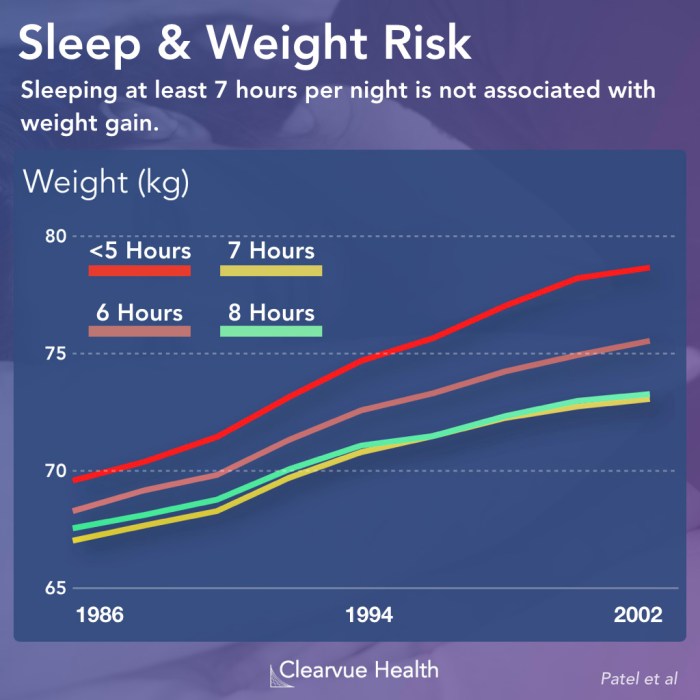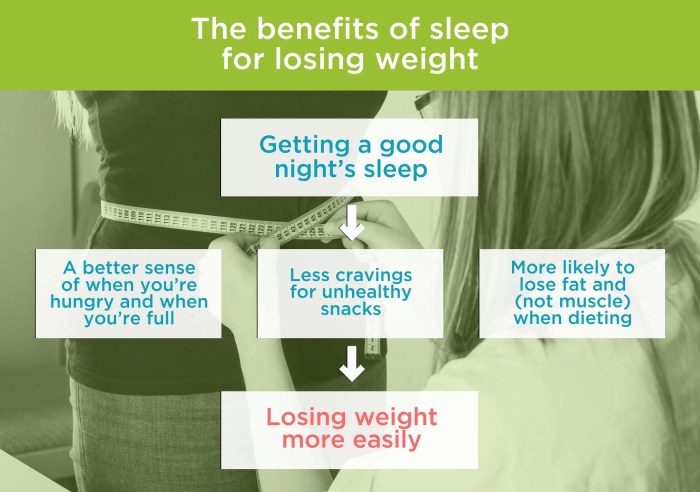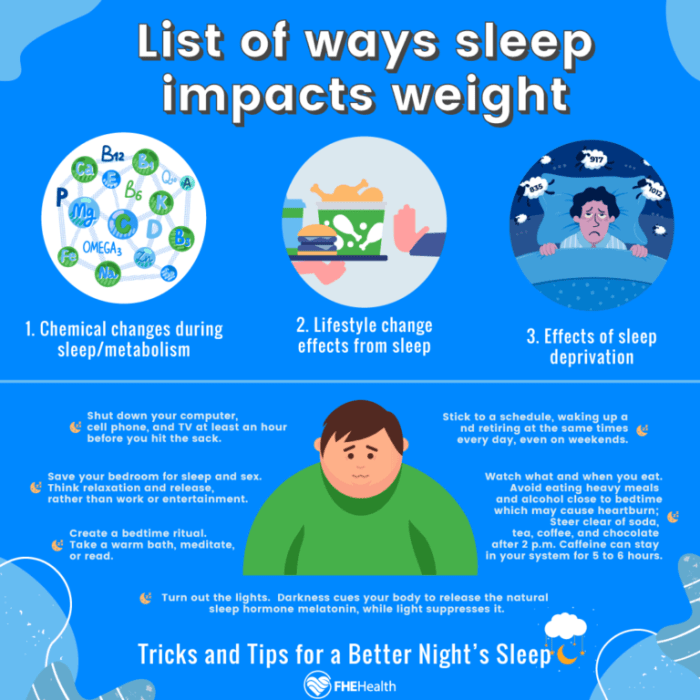The role of sleep in weight loss over 40 is often overlooked, yet it holds the key to unlocking a slimmer, healthier you. As we age, our sleep patterns change, and so does our metabolism. Discover how getting enough shut-eye can boost your weight loss journey and help you achieve your goals.
Sleep deprivation can disrupt hormone regulation, leading to increased hunger and decreased metabolism. It also affects energy expenditure, making it harder to burn calories. Moreover, poor sleep can impair insulin sensitivity, leading to weight gain. Understanding the connection between sleep and weight loss is crucial for anyone over 40 looking to shed some pounds.
Introduction
Sleep plays a crucial role in maintaining a healthy weight, and its significance becomes even more pronounced as we age. Individuals over 40 often experience changes in their sleep patterns, which can have a negative impact on their weight management efforts.
Studies have shown that a significant proportion of people in this age group struggle with sleep issues such as insomnia, sleep apnea, and restless legs syndrome. Understanding the connection between sleep and weight loss can help us make informed choices to improve our overall health and well-being.
Sleep and Metabolism
Sleep is essential for regulating metabolism, the process by which the body converts food into energy. During sleep, the body releases hormones that promote fat breakdown and muscle growth. Lack of sleep can disrupt these hormonal processes, leading to increased fat storage and decreased muscle mass.
Additionally, sleep deprivation can impair glucose metabolism, making it harder for the body to use insulin effectively and potentially contributing to weight gain.
Impact of Sleep on Metabolism
Sleep plays a crucial role in regulating metabolism, the process by which the body converts food into energy. When we don’t get enough sleep, our hormone regulation can be disrupted, affecting both our metabolism and appetite.
Hormonal Regulation
- Leptin:A hormone that signals fullness to the brain, suppressing appetite.
- Ghrelin:A hormone that stimulates hunger, increasing appetite.
Sleep deprivation can decrease leptin production and increase ghrelin production, leading to an imbalance that promotes hunger and reduces feelings of fullness. This hormonal disruption can make it harder to resist cravings and overeat, contributing to weight gain.
Sleep and Energy Expenditure: The Role Of Sleep In Weight Loss Over 40
Sleep plays a crucial role in regulating energy expenditure. Adequate sleep helps maintain hormonal balance, which influences appetite and metabolism. When we’re sleep-deprived, our bodies produce more of the hunger hormone ghrelin and less of the satiety hormone leptin, making us more likely to overeat.
Physical Activity and Calorie Burn
Sleep deprivation can significantly reduce physical activity and calorie burn. Studies have shown that people who get less than 7 hours of sleep per night are more likely to be sedentary and burn fewer calories during exercise. This is because sleep deprivation affects our motivation, energy levels, and cognitive function, making it harder to engage in physical activities.
Sleep and Insulin Sensitivity
Sleep plays a crucial role in maintaining insulin sensitivity, which is essential for glucose metabolism and weight regulation. When we sleep, our bodies release hormones that help us utilize glucose more efficiently.
However, when we don’t get enough sleep, our insulin sensitivity decreases, impairing our ability to use glucose properly. This can lead to increased blood sugar levels, which can contribute to weight gain and the development of type 2 diabetes.
Insulin Resistance
Chronic sleep deprivation can lead to insulin resistance, a condition in which the body’s cells become less responsive to insulin. This can result in:
- Increased blood sugar levels
- Weight gain
- Increased risk of developing type 2 diabetes
Getting enough sleep can help improve insulin sensitivity, reduce blood sugar levels, and lower the risk of weight gain and type 2 diabetes.
Sleep and Stress
Sleep plays a crucial role in managing stress levels. Chronic stress can disrupt sleep patterns, leading to a vicious cycle that contributes to weight gain.
Impact of Stress on Sleep
- Increased cortisol levels:Stress triggers the release of cortisol, which can interfere with sleep initiation and maintenance.
- Sympathetic nervous system activation:Stress activates the sympathetic nervous system, which can lead to increased heart rate, blood pressure, and muscle tension, making it harder to fall asleep.
- Cognitive arousal:Stress can lead to racing thoughts and worries, making it difficult to relax and fall asleep.
Sleep Deprivation and Weight Gain
- Increased cravings:Sleep deprivation can increase cravings for unhealthy foods, as the body seeks energy to compensate for lost sleep.
- Hormonal imbalances:Sleep loss can disrupt the production of hormones that regulate appetite, such as leptin and ghrelin.
- Reduced physical activity:Feeling tired from sleep deprivation can lead to reduced physical activity, which can further contribute to weight gain.
Sleep and Emotional Eating
Sleep plays a crucial role in regulating our emotions and appetite. When we’re sleep-deprived, our bodies produce more of the stress hormone cortisol, which can increase cravings for unhealthy foods.
Additionally, sleep deprivation can disrupt our body’s production of leptin and ghrelin, two hormones that regulate hunger and fullness. This can lead to overeating and weight gain.
Leptin and Ghrelin
- Leptin is a hormone that signals the brain when we’re full.
- Ghrelin is a hormone that stimulates hunger.
- Sleep deprivation can decrease leptin production and increase ghrelin production, leading to increased appetite and cravings.
Sleep and Body Composition
Sleep plays a crucial role in maintaining a healthy body composition. When you’re well-rested, your body produces hormones that promote fat loss and muscle growth. However, when you’re sleep-deprived, your body produces more of the stress hormone cortisol, which can lead to increased body fat and decreased muscle mass.
When it comes to weight loss over 40, sleep plays a crucial role. A good night’s rest can help regulate hormones, boost metabolism, and reduce cravings. For inspiration, check out weight loss success stories from women who have overcome similar challenges.
Remember, sleep is a powerful tool in your weight loss journey, so make sure you’re getting enough zzz’s.
Cortisol and Body Composition
Cortisol is a hormone that is released in response to stress. It helps your body to mobilize energy and cope with stressful situations. However, when cortisol levels are chronically elevated, it can lead to a number of health problems, including weight gain.Cortisol
You’ve been working hard on your sleep schedule, and it’s finally paying off! You’re losing weight, and you’re feeling great. But what if you could lose weight even faster? If you’re a woman over 40, there are some great weight loss recipes that can help you reach your goals.
These recipes are designed to help you boost your metabolism and burn fat. So if you’re ready to take your weight loss to the next level, give these recipes a try. You won’t be disappointed!
can increase body fat by promoting the storage of fat in the abdominal area. It can also decrease muscle mass by breaking down muscle tissue. This can lead to a decrease in metabolism and an increase in body fat.
Optimal Sleep Duration
For individuals over 40 aiming for weight loss, obtaining adequate sleep is crucial. The recommended sleep duration ranges from 7 to 9 hours each night, as per the National Sleep Foundation.
Insufficient sleep can disrupt hormonal balance, metabolism, and energy levels, all of which can hinder weight loss efforts. When sleep-deprived, the body produces more of the hunger hormone ghrelin and less of the satiety hormone leptin, leading to increased appetite and reduced feelings of fullness.
Consequences of Insufficient Sleep
- Increased cravings for unhealthy foods
- Reduced motivation for physical activity
- Impaired cognitive function, making it harder to make healthy choices
- Increased risk of obesity and other chronic diseases
Sleep Hygiene Practices
Getting quality sleep is crucial for weight loss over
Getting enough sleep is crucial for weight loss over 40. When you’re sleep-deprived, your body produces more of the stress hormone cortisol, which can lead to increased belly fat. So, if you’re struggling to lose weight, make sure you’re getting at least 7-8 hours of sleep each night.
And for even more weight loss motivation, check out our article on Weight loss motivation for women over 40 . This article provides tips and advice to help you stay motivated and on track with your weight loss goals. Plus, it includes success stories from other women over 40 who have lost weight and kept it off.
So, if you’re ready to make a change, click the link and get started today!
40. Here are some effective sleep hygiene practices that can improve your sleep
Creating a Conducive Sleep Environment, The role of sleep in weight loss over 40
- Create a dark, quiet, and cool room for sleep.
- Use blackout curtains, earplugs, or a white noise machine to minimize distractions.
- Ensure your bedroom is well-ventilated and comfortable.
Establishing a Regular Sleep-Wake Cycle
- Go to bed and wake up at the same time each day, even on weekends.
- This helps regulate your body’s natural sleep-wake cycle.
- Avoid napping during the day, or keep naps short (less than 30 minutes).
Avoiding Caffeine and Alcohol Before Bed
- Caffeine and alcohol can interfere with sleep quality.
- Avoid consuming them in the hours leading up to bedtime.
Barriers to Sleep
Sleep can be elusive for individuals over 40, as they often face unique barriers that disrupt their sleep patterns. These barriers can range from physical ailments to lifestyle factors and can significantly impact overall health and well-being.
Overcoming these barriers is crucial for achieving optimal sleep and maximizing the benefits it offers for weight loss. Let’s explore some common barriers and effective solutions to help you improve your sleep quality.
Managing Stress
- Stress is a major contributor to sleep disturbances. Identify sources of stress in your life and develop healthy coping mechanisms, such as exercise, meditation, or spending time in nature.
- Consider seeking professional help if stress is overwhelming and impacting your sleep significantly.
Treating Underlying Medical Conditions
- Certain medical conditions, such as sleep apnea, restless legs syndrome, and thyroid issues, can disrupt sleep. Consult with a healthcare professional to diagnose and treat any underlying medical conditions that may be affecting your sleep.
- Medications or lifestyle changes may be necessary to manage these conditions and improve sleep quality.
Creating a Relaxing Bedtime Routine
- Establish a consistent sleep-wake cycle, even on weekends. Going to bed and waking up around the same time helps regulate your body’s natural sleep-wake rhythm.
- Create a relaxing bedtime routine that includes activities such as taking a warm bath, reading a book, or listening to calming music.
- Avoid caffeine and alcohol before bed, as they can interfere with sleep.
- Ensure your bedroom is dark, quiet, and cool, as these conditions are optimal for sleep.
Conclusion
In summary, sleep plays a crucial role in weight loss over 40. Prioritizing sleep can enhance metabolism, energy expenditure, insulin sensitivity, and reduce stress and emotional eating, leading to improved body composition. Aim for optimal sleep duration and practice good sleep hygiene habits to support your weight management efforts.
If you consistently struggle with sleep, don’t hesitate to seek professional help. A healthcare professional can identify any underlying sleep disorders or provide guidance on improving your sleep quality. Remember, getting enough sleep is not just a matter of comfort; it’s essential for your overall well-being and weight loss journey.
Ultimate Conclusion
Prioritizing sleep is essential for successful weight management over 40. Aim for 7-9 hours of quality sleep each night, and follow sleep hygiene practices to improve your sleep quality. If you experience persistent sleep difficulties, don’t hesitate to seek professional help.
By addressing sleep issues, you can unlock the full potential of your weight loss journey and achieve your desired results.
Key Questions Answered
How much sleep do I need over 40 for weight loss?
Aim for 7-9 hours of quality sleep each night.
Why does sleep affect weight loss?
Sleep deprivation disrupts hormone regulation, affects energy expenditure, and impairs insulin sensitivity.
What are some tips for improving sleep quality?
Establish a regular sleep-wake cycle, create a conducive sleep environment, and avoid caffeine and alcohol before bed.



